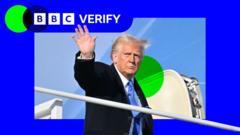As President Trump eyes the acceptance of a $400 million plane from Qatar, doubts arise regarding its legality and potential conflicts of interest.
**Trump's $400 Million Plane Gift from Qatar: Legal Concerns Raised**

**Trump's $400 Million Plane Gift from Qatar: Legal Concerns Raised**
News surrounding the proposed acceptance of a luxurious aircraft sparks controversy amid legal debates.
US President Donald Trump has recently expressed a desire to accept a Boeing jumbo jet valued at approximately $400 million from the Qatari royal family, stating that it would be "stupid" to refuse such a generous offer. This initiative has drawn criticism from some opposition members of the Democratic Party, who describe the move as "wildly illegal." The White House, however, has dismissed these accusations. Qatar has since responded, calling reports of the aircraft a misunderstanding, though talks about the deal are still ongoing.
Reports indicate that the aircraft, which could potentially serve as a temporary Air Force One, has been showcased during Trump's current visit to the Middle East, including Qatar. After inspecting the plane, Trump stated on social media that it would be a free "gift" to the Defense Department to replace the aging Air Force One jets. Trump emphasized his appreciation for the offer, arguing that accepting such a gift would not only benefit his administration but also build stronger relations with Qatar.
Critics, including some of Trump's usual supporters, are wary of the implications of accepting a gift of this magnitude. Democratic leaders, such as Senator Adam Schiff, have pointed to the U.S. Constitution, which prohibits any elected official from receiving presents from foreign leaders without congressional approval. Experts in constitutional law note that while the intention behind this clause was to prevent bribery, the specifics of this gift agreement raise nuanced legal questions.
While Trump has suggested that the aircraft would eventually be housed at his presidential library, legal scholars warn that the potential for misuse must be scrutinized. Historically, gifts valued over a certain amount require congressional consent due to the Foreign Gifts and Decorations Act of 1966. Currently, officials can accept lesser gifts without such authorization. The idea that the plane may pass through government hands before being transferred to Trump's foundation might not bypass constitutional regulations.
The U.S. Justice Department is reportedly working on a legal memo regarding the acceptability of this transaction, but the specifics of its content remain undisclosed. The organizers involved are optimistic about compliance with federal law, with the White House Press Secretary claiming that details are still under negotiation.
Accompanying Trump on this diplomatic mission are his sons, who are actively promoting the Trump Organization's interests, including expansive business ventures in the Gulf region. Recent announcements include plans for luxurious properties and golf courses in Qatar and the UAE, which have raised eyebrows regarding the separation of Trump's official duties from family business interests. White House officials have firmly rejected insinuations that Trump’s dealings could be motivated by personal profit.
As the situation unfolds, the legality of Trump accepting a high-profile gift remains a hot topic of debate, highlighting the intersection of politics, law, and international diplomacy.






















